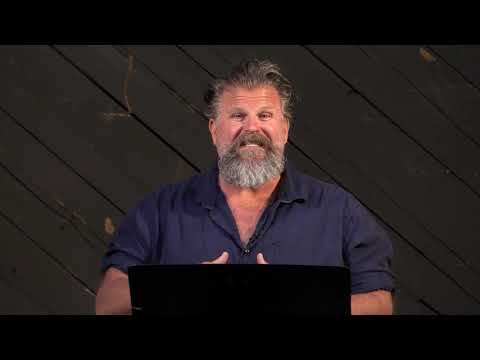
1 Corinthians 8:7-13 Bible Teaching
Shawn teaches on 1 Corinthians 8:7-13, emphasizing love and respect for weaker faith, avoiding actions that cause others to stumble, and prioritizing others' spiritual well-being.

Shawn teaches on 1 Corinthians 8:7-13, emphasizing love and respect for weaker faith, avoiding actions that cause others to stumble, and prioritizing others' spiritual well-being.

Paul's teaching to Corinthians: Idols are powerless; love and edification matter. Knowledge without love leads to arrogance. Prioritize love over legalism. 1 Cor 8:1-3.

Shawn teaches Full Preterism, asserting all biblical prophecies are fulfilled, including Christ's return. Revelation is allegorical, focusing on persecution under Nero, with Gog and Magog symbolizing eschatological conflicts. Christ's spiritual kingdom fulfills Davidic prophecies, countering premillennial views.

EBV claims the resurrection occurred in 70 AD with Christ's parousia, ending God's redemptive history. It emphasizes spiritual transformation, ongoing salvation, and rejects new revelations.

Paul advises singleness for spiritual focus; marriage involves worldly concerns. Bible translations evolved from Vulgate to King James. Interpretations vary; consult multiple versions.

Shawn examines Matthew 27:52-53, arguing for a temporary resurrection like Lazarus, not eternal. He aligns with Covenant Eschatology, emphasizing fulfillment by 70 AD.

Believers should maintain peace in marriages, focus on internal transformation, serve God in current life situations, and prioritize faith over external changes.

Shawn teaches resurrection as a spiritual event, not physical, emphasizing love and spiritual truths over literal interpretations. He critiques traditional doctrines and encourages diverse views.

Paul advises believers to let unbelieving spouses leave for peace, emphasizing spiritual maturity and peace over conflict. Christians should embody the fruits of the Spirit and wear God's armor for spiritual warfare.

Shawn teaches that Paul's marital guidance in 1 Corinthians 7 is context-specific, emphasizing spiritual growth over rigid scripture application. Marriage is sacred, guided by the Spirit, and unity is paramount.

Shawn's teaching reinterprets Revelation 20, emphasizing Satan's defeat by Jesus, the symbolic "thousand years" as martyrs reigning with Christ, and judgment from heaven.

Script currently unavailable.

Shawn emphasizes Paul's advice in 1 Corinthians 7:1-11 on marriage, celibacy, mutual consent, and self-control, highlighting individual gifts and the importance of personal interpretation.

Shawn contrasts Russell's view of the Millennium starting in 70 AD with full preterism's past event view (30-70 AD). McKensie suggests "premillennial preterism," starting the Millennium at AD 70.

Paul urges Corinthians to flee fornication, emphasizing bodily purity as the body is the Holy Spirit's temple. Believers, bought by Jesus, should glorify God in body and spirit.

Believers in Christ are transformed, washed, sanctified, and justified. All actions are lawful but not all are beneficial. Focus on spiritual renewal, avoid sin, live in liberty.

Script currently unavailable.

Shawn's teaching explores Revelation 19's prophecy fulfillment, focusing on the destruction of Jerusalem in 70 AD, preterist views, and eschatological interpretations like amillennialism and postmillennialism.

Paul critiques the Corinthians for using secular courts, urging internal resolution of disputes, emphasizing believers' capacity to judge, and highlighting unity and spiritual integrity.

Shawn's teaching highlights the Last Supper's significance, spiritual rebirth, and transformation through Christ's life, death, and resurrection, emphasizing faith-driven living.

Shawn's teaching on Revelation 19 highlights the symbolic end of Judaism, the spiritual marriage of the Bride of Christ, and the necessity of spiritual readiness. It emphasizes the unified message of Jesus throughout the Bible, portraying Him as the Messiah with divine authority, and discusses prophetic imagery and historical events like Jerusalem's destruction.

Paul and Shawn emphasize expelling immorality, using leaven as a metaphor for sin. They stress humility, sincerity, and purity, avoiding pride and corrupt influences.

Revelation 19 highlights heavenly celebration for God's judgment, Jesus as "Faithful and True," defeat of evil, and the Church as the Bride. Shawn emphasizes God and Jesus' distinct roles, "Hallelujah" as worship, and the Church's preparation for spiritual union with Christ.

Paul addresses immorality in Corinth, urging removal of a man with his father's wife to prevent corruption. He criticizes pride, stresses church purity, and uses apostolic authority.

Shawn's teaching links Babylon's fall in Revelation to Jerusalem's 70 AD destruction, highlighting idolatry, covenant shift, and temple's end, using biblical and historical parallels.

Revelation 18 details Babylon's fall, symbolizing corruption. Shawn's teaching highlights spiritual desolation, urging believers to separate from sin and maintain faithfulness.

Paul urges Corinthians to imitate him as he follows Christ, emphasizing unity, integrity, and spiritual authority over eloquence. True faith is shown by inner transformation and love.

Shawn's teaching interprets Revelation 17, identifying the woman as fallen Jerusalem, the beast as Nero/Rome, and explores historical context, partial preterism, and prophetic events.

Paul asserts his apostolic authority, contrasting genuine guidance with false teachings, emphasizing love and spiritual fatherhood. Shawn highlights believers as spiritual parents through the Gospel. The Word of God is powerful, with Jesus as its embodiment, connecting humanity to God.

Paul contrasts self-important teachers with apostles who endure hardships, emphasizing humility, spiritual power, and genuine devotion to Christ over worldly pursuits.